|

Insectum is preparing its global rollout via a franchise-based model. Photo: Insectum ApS
Insectum Emerges as Danish Insect Industry's Sole Survivor, Poised for Global Expansion
 (DENMARK, 11/24/2025)
(DENMARK, 11/24/2025)
Patented, Modular Technology Turns Waste into Protein, Targets Developing Countries
The Danish insect industry has undergone a major upheaval, leaving Insectum as the only remaining player. This follows the high-profile bankruptcy of Enorm Biofactory last week, which closed with a staggering deficit of 582 million kroner (approximately 77.9 million euros). Another company, Nordjyske Entomass, which also worked with black soldier fly larvae, went bankrupt in June 2022. Both failed firms had focused on large-scale Danish production using thousands of stacked boxes.
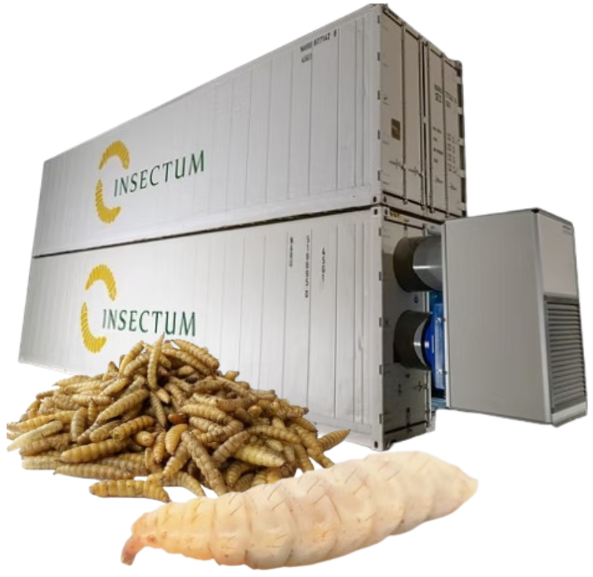
A Radical, Container-Based Approach
Insectum has secured its position by adopting a radically different, patented, modular technology aimed at tackling three global challenges: organic waste management, food shortages, and job creation.
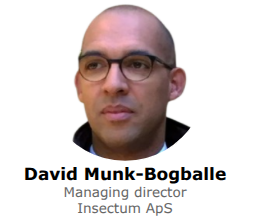 Unlike its predecessors, Insectum utilizes a plug-and-play production system that is container-based, simple, robust, portable, and highly scalable. Unlike its predecessors, Insectum utilizes a plug-and-play production system that is container-based, simple, robust, portable, and highly scalable.
"Instead of thousands of small boxes that require buildings, complicated handling, micro-dosing, advanced controls, and robotic systems, our technology makes it possible to use entire 40-foot containers as units," explains David Munk-Bogballe, Insectum's director.
The production units, known as "towers," consist of two stacked containers forming a self-contained unit connected to a simple feed plant, similar to systems used in pig production. This standardized, mass-producible, and modular system can reduce establishment costs by up to 70 percent compared to traditional industrial factory solutions. The technology is already patented in 50 countries.
Simplicity and Economics: The Key to Success
 Aarhus University (AU) Denmark FIS Seafood Media.png) Expert opinion supports Insectum's strategic focus on simplicity and low cost. Jan Værum Nørgaard, a professor and head of department at the Department of Animal and Veterinary Sciences (ANIVET) at Aarhus University (AU), emphasizes this point: Expert opinion supports Insectum's strategic focus on simplicity and low cost. Jan Værum Nørgaard, a professor and head of department at the Department of Animal and Veterinary Sciences (ANIVET) at Aarhus University (AU), emphasizes this point:
"If the insect industry is to succeed, it requires solutions that are technically simple and economically realistic... Particularly outside the EU, insects are a real solution for both feed production and waste management, where the need for protein is great," says Nørgaard.
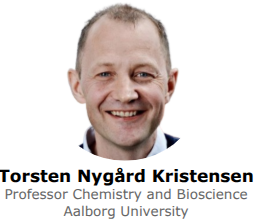 Furthermore, Denmark has built up a strategic knowledge base in insect production. Torsten Nygård Kristensen, a professor at the Department of Chemistry and Bioscience at Aalborg University, notes: "Over recent years, we have gained an increasingly deeper understanding of the larvae's biology and their potential... This has given us a research position that can contribute significantly..." Furthermore, Denmark has built up a strategic knowledge base in insect production. Torsten Nygård Kristensen, a professor at the Department of Chemistry and Bioscience at Aalborg University, notes: "Over recent years, we have gained an increasingly deeper understanding of the larvae's biology and their potential... This has given us a research position that can contribute significantly..."
Franchise Model and First Major Investment in Uganda
Insectum is preparing its global rollout via a franchise-based model, developed with help from Bech-Bruun. Under this model, investors and local partners own and operate the plants, while Insectum provides the technology, training, and operational frameworks.
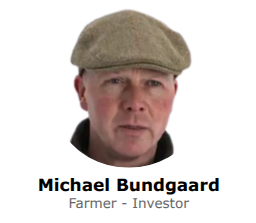 This model has attracted significant attention, including from Michael Bundgaard, a Danish farmer and investor with a background in pig production and composting. Bundgaard, who founded a company with Insectum in 2023 to validate the technology, is now ready to invest in the first major plant in Uganda. This model has attracted significant attention, including from Michael Bundgaard, a Danish farmer and investor with a background in pig production and composting. Bundgaard, who founded a company with Insectum in 2023 to validate the technology, is now ready to invest in the first major plant in Uganda.
"The system is robust and so logical from a farmer's perspective that you can operate a plant yourself. That gives me peace of mind as an investor," states Bundgaard.
The Uganda project is budgeted at 2.5 million euros and is projected to produce 1,500 tonnes of larvae per year, simultaneously removing approximately 5,500 tonnes of organic waste.
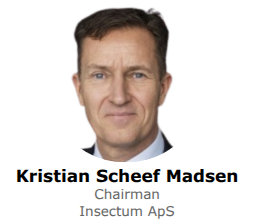 Kristian Scheef Madsen, Insectum's chairman of the board, highlights the financial viability: "The payback period is typically under three years." Kristian Scheef Madsen, Insectum's chairman of the board, highlights the financial viability: "The payback period is typically under three years."
Insectum is actively seeking more investors and partners to join its international rollout to bring sustainable protein production to regions in need.
editorial@seafood.media
www.seafood.media
Information of the company:
|



